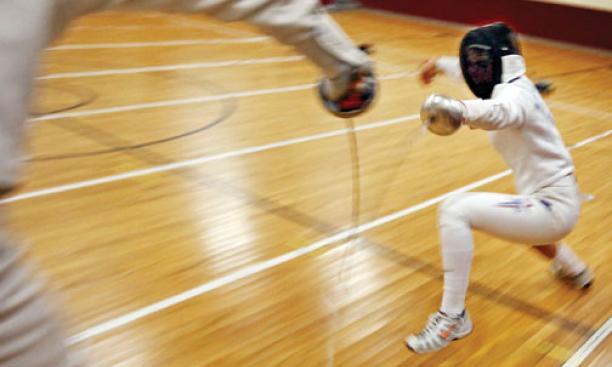

Jonathan Yergler ’13 and Edward Kelley ’13 first competed against each other as 10-year-olds at a national fencing tournament. In the decade since, the two epeeists have become rivals, friends, and at Princeton, teammates and roommates. This year, they have one more common bond: They’re traveling the world to compete in Junior World Cup events, in hopes of earning spots on the U.S. under-20 national team.
Yergler and Kelley — ranked Nos. 2 and 3 in the country, respectively, in their age group — were slated to visit Texas, Switzerland, and Sweden during a four-week span starting in January. Their first Princeton event of the new year will be their team’s most important home meet: the Ivy League Championships, Feb. 12–13 at Jadwin Gym.
After facing off against the world’s best, the Princeton fencers should be “primed and ready” for their Ivy rivals, Yergler says. But, Kelley adds, the time away from campus has drawbacks, especially when it means missing team events. “It’s tough to know that your team is fencing and you’re not going to be able to be there,” Kelley says.
The Tigers have fared well in the absence of their young stars. On Dec. 5, with Kelley and Yergler competing in Finland and women’s epeeist Hannah Safford ’13 in Spain, Princeton’s men’s and women’s teams won nine of 10 meets at the Sacred Heart Duals, includ ing a 15–12 men’s victory over Penn State, the defending NCAA champion.
Princeton’s fencers also had good showings abroad that weekend. Safford won her Junior World Cup event, topping a field of more than 50 elite epeeists, and Yergler and Kelley each earned top-10 finishes in Finland.
Princeton has a history of success in international fencing. A half-dozen Tigers have reached the Olympics — the most recent two, Kamara James ’08 and Soren Thompson ’05, competed at the 2004 games in Athens — and head coach Zoltan Dudas aims to continue bringing elite competitors into his program, even if it means not having them in the lineup for every meet.
“We’re trying to attract this kind of athlete,” Dudas says. “Several of our athletes have proven it’s possible to do well in the classroom and compete at the international level.”
Perhaps the best example is Susannah Scanlan ’12, the team’s representative on last winter’s Ivy All-Academic team and an All-American epeeist in each of her first two seasons at Princeton. Like Kelley, Yergler, and Safford, Scanlan had competed in international events before coming to college, so she’d had some practice managing the demands of academics and fencing. At Princeton, Scanlan says, she learned to seek extra help in difficult courses and carve out time for a good night’s sleep.
That approach may work for part-time travelers, but this spring, Scanlan is expanding her competition schedule in hopes of qualifying for the 2012 Olympics in London. She’ll be on leave from Princeton for three semesters. Another women’s fencer, foilist Ambika Singh ’14, is taking time off to prepare for an Olympic bid as well.
The absences of Scanlan, Singh, and a handful of other elite athletes from Harvard and Columbia have made it difficult to forecast this year’s Ivy Championships. Princeton won both the men’s and women’s titles last year, and Kelley says he has been urging friends and classmates to pack the stands at Jadwin. “If you’ve never seen fencing, this is the best time,” he says. “It’s one of the highest levels of NCAA competition, and it’s right here.”
